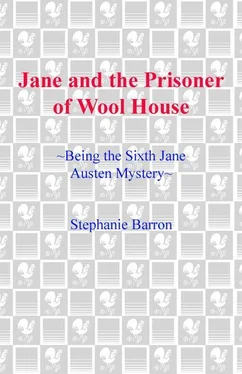Stephanie Barron - Jane and the Prisoner of Wool House
Здесь есть возможность читать онлайн «Stephanie Barron - Jane and the Prisoner of Wool House» весь текст электронной книги совершенно бесплатно (целиком полную версию без сокращений). В некоторых случаях можно слушать аудио, скачать через торрент в формате fb2 и присутствует краткое содержание. Жанр: Исторический детектив, Иронический детектив, на английском языке. Описание произведения, (предисловие) а так же отзывы посетителей доступны на портале библиотеки ЛибКат.
- Название:Jane and the Prisoner of Wool House
- Автор:
- Жанр:
- Год:неизвестен
- ISBN:нет данных
- Рейтинг книги:4 / 5. Голосов: 1
-
Избранное:Добавить в избранное
- Отзывы:
-
Ваша оценка:
- 80
- 1
- 2
- 3
- 4
- 5
Jane and the Prisoner of Wool House: краткое содержание, описание и аннотация
Предлагаем к чтению аннотацию, описание, краткое содержание или предисловие (зависит от того, что написал сам автор книги «Jane and the Prisoner of Wool House»). Если вы не нашли необходимую информацию о книге — напишите в комментариях, мы постараемся отыскать её.
Jane and the Prisoner of Wool House — читать онлайн бесплатно полную книгу (весь текст) целиком
Ниже представлен текст книги, разбитый по страницам. Система сохранения места последней прочитанной страницы, позволяет с удобством читать онлайн бесплатно книгу «Jane and the Prisoner of Wool House», без необходимости каждый раз заново искать на чём Вы остановились. Поставьте закладку, и сможете в любой момент перейти на страницу, на которой закончили чтение.
Интервал:
Закладка:
“So much coin for Seagrave's guilt — for he must already have been well paid for the construction of the evidence — and so much more, for a subsequent avowal of Seagrave's innocence?”
“It might assuage his conscience, at the same moment it lined his purse.”
“And he could not hope for advancement in his naval career, did he recant of his charge,” I added thoughtfully. “Even did Chessyre profess himself confused— mistaken — unwitting in his accusation — he must be regarded as highly unsteady by the panel. He must be cashiered for calumny at least.”
My brother was silent an interval. Then he sighed. “I am too simple a man for prognostication. Chessyre is fled, Jane; and what Chessyre intends for the morrow must remain in question.”
I sipped the last of my chocolate. “We ought, nonetheless, to take measures against the worst that Chessyre might do.”
“Your French surgeon?” Frank cocked his head. “Very well. I shall go this morning to Wool House and petition Mr. Hill for the loan of his patient.”
“Will Admiral Bertie consent?”
“Admiral Bertie is so adamant in his refusal to credit any Frenchman of disinterested good, that he warns me soundly to be on my guard, and thinks it very likely your surgeon shall not receive a hearing before Seagrave's court. We can but try.”
I set aside my breakfast plate without further ado. “Then I shall accompany you.”
“There is not the slightest need.”
“On the contrary,” I retorted. “I have been ordered by Martha to procure a box for the theatre tonight; and Wool House lies in my way. You cannot thwart me in this, Fly. Mrs. Jordan is to play.” [12] Dorothea Jordan was one of the most accomplished comic actresses of the late Georgian period, a regular performer at Covent Garden and Drury Lane. For many years the mistress of William, Duke of Clarence (later William IV), she bore him ten children before their parting in 1811. — Editor's note.
“Mrs. Jordan!” he cried. “And poor Mary has not seen the inside of a theatre in weeks. It was always her chief delight I secured the promise of her affection, you know, during the interval of a play at Ramsgate; and must always accord the theatre my heartfelt gratitude.”
“Then it is decided. You shall make another couple of our party, and I shall walk out with you now in the direction of French Street. I only stay to discover my bonnet.”
“I hope Mary may not swoon,” Frank added. “The crush, you know, is likely to be fearful if Mrs. Jordan is to play.”
“Let her swoon, and welcome!” I said in exasperation. “A lady in an interesting condition has so few opportunities to shine in public; and Mary, in fainting charmingly, might divert the attention of all assembled from a royal mistress. Think what delights she shall have in store! A play, and a personal act of considerable distinction! When one is grown old, and sources of satisfaction are few, it is much to relive one's youth in recounting such a tale.”
Chapter 9
Scenes Played in French Street
25 February 1807, cont.
I MOUNTED THE STEPS TOWARDS MY ROOM IN SEARCH OF my. bonnet, a parcel clutched to my breast. Martha was in the act of descending, and the staircase being narrow, one of us must be forced to give way. I elected the office, and pressed myself flat against the wall.
“I have ordered of Mrs. Davies a good dinner,” she told me, “and begged that it might be early, on account of Mrs. Jordan. I do hope we may secure good seats! Do you think that your mother might be persuaded to make another of the party?”
“I do not think wild dogs could keep her from French Street. It is exactly the sort of amusement calculated to drive her from her bed.”
“She has been very low,” Martha mused, “but I cannot make out any symptoms of decline. Perhaps a change of season, coupled with a change of domicile, will offer amendment.”
“Was she very pitiful when you begged admittance this morning?
“I counted only three sighs and one dab at the eyes,” Martha replied, “but you know that talk of an early dinner must always raise her spirits.”
“True. Had I recollected the fact earlier, we all might have spent the winter months in tolerable good humour.”
I have known Martha Lloyd since I was fourteen. It was in 1789 that her mother, a clergyman's widow, settled in Deane and rented from my father the neglected parsonage; and though the Lloyds very soon removed again, to Ibthorp, the bond of our friendship endured. It is true, as Mary says, that Martha is ten years my senior, and might be supposed to have found a better companion in a girl closer to her own age; but there has hardly been a time when Martha and I did not share a good joke, or chatter about our acquaintance, or dispose of our friends in marriages they should never have thought of for themselves. Martha is as much my sister as Cassandra could be — more, in some respects, because she so often shares my turn of mind. We two have lain awake far into the morning, after many a ball, abusing everyone within our acquaintance, and have never failed to move each other to laughter.
But if I cherish her for her ready understanding and convivial spirit, I must acknowledge that her true value lies far beyond these. Martha, at forty, has honed and measured her strength. She has watched her younger sisters marry and have the joy of children; she has presided over the deathbed of her mother, and seen her buried; moved alone and penniless into the world, to take up a home without the slightest assurance of its permanence; and never has she complained or expressed a wish to exchange her lot.
“Frank intends to walk into French Street, though not so far as the theatre,” I informed this paragon of female virtue. “Should you like to join us?”
“With pleasure. Too many hours confined in a carriage must cripple a woman of advanced years; I should benefit from the exercise.”
“We might return by way of Bugle Street,” I added thoughtfully, “and look in upon the house in Castle Square. I cannot convince myself of its being habitable without the constant reassurance of my own eyes.”
“Surely the renovations are finished! Or have the painters been too often pressed into our neighbour's service?”
The Marchioness of Lansdowne — the neighbour whom Martha chuses to regard so familiarly — presides over the Gothic folly immediately adjacent to our house in Castle Square. She is everywhere acknowledged as a former courtesan, and as such, is permitted an eccentricity of behaviour that should be shocking in a female gently bred. She drives a diminutive team of eight ponies, each pair tinier than the next, and is much given to rouging her cheeks. Her husband the Marquis has taken a kindly interest in the Austen project of renovation — as naturally he must, being our landlord. The Marchioness's favoured house-painter has been pressed upon us for the improvement of our rooms. It is a family joke that when not required about the Marquis's walls, the painter must often be tending to the Marchioness's face.
Martha peered at me narrowly. “Whatever are you clutching to your breast, Jane? A foundling in swaddling clothes, that you intend to lay at the Marchioness's door?”
“Eggs,” I replied. “Mary would buy several dozen in the market yesterday, and now finds that they bring on bilious attacks. She begged that they be hidden from sight as soon as may be. And as Frank intends a visit to Wool House, I thought they might better be used in treating the sick.”
“Frank at Wool House? And after such a demonstration of temper?” Martha's eyebrows rose. “That is a reversal. You know that I can never ignore an opportunity to observe your brother reformed and penitent. Naturally I shall come.”
Читать дальшеИнтервал:
Закладка:
Похожие книги на «Jane and the Prisoner of Wool House»
Представляем Вашему вниманию похожие книги на «Jane and the Prisoner of Wool House» списком для выбора. Мы отобрали схожую по названию и смыслу литературу в надежде предоставить читателям больше вариантов отыскать новые, интересные, ещё непрочитанные произведения.
Обсуждение, отзывы о книге «Jane and the Prisoner of Wool House» и просто собственные мнения читателей. Оставьте ваши комментарии, напишите, что Вы думаете о произведении, его смысле или главных героях. Укажите что конкретно понравилось, а что нет, и почему Вы так считаете.












